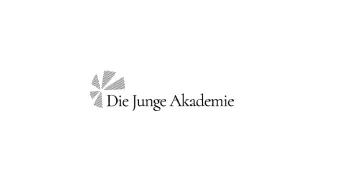An intellectual playground for researchers with a creative spirit, a unique creative hub – members and alumni are quick to express intense enthusiasm when describing Die Junge Akademie. Dr Lukas Haffert, Senior Assistant in the Institute for Political Science at the University of Zurich and a DAAD alumnus, sums it up like this: ‘Die Junge Akademie is the reality behind the way academia is portrayed in popular panegyrics: we don’t feel any pressure and are allowed to indulge in our curiosity and the desire to collaborate with highly interesting people.’
Bringing academia and society together in conversation
Die Junge Akademie was founded in 2000 as a joint project of the Berlin-Brandenburg Academy of Sciences and Humanities and the German National Academy of Sciences Leopoldina. Ten new members from different disciplines are elected each year for a five-year term, and they regularly include DAAD alumni. A key requirement for membership is an outstanding PhD dissertation that should have been completed at least three, but no more than seven years prior to admission, or an outstanding work of artistic qualification. ‘Die Junge Akademie offers many opportunities for the next generation of academics to pursue new ideas in a relaxed atmosphere’, says Laura Forstbach, Academic Coordinator at the Office in Berlin: ‘Our objective is that members advocate a sustainable science system and seek ways to create stronger links between academia and society.’
Members are free to choose their form of work: they can access a smaller personal budget as well as the central research budget, which is spent based on joint decisions. In addition to publications and art events, Die Junge Akademie has also produced a science simulation game called ‘Peer Review’. Last year, six members went on an interdisciplinary expedition to glaciers in Ecuador to research the impacts of climate change using methods based on glaciology, biology, chemistry, sound ecology, computer science and medicine.
„Lebenssequenzen – eine filmische Vermessung“
There are presently 11 working groups that form the core behind the joint activities. Their thematic focus extends from dispute cultures to artificial intelligence to sustainability. Most members are simultaneously involved in multiple groups. The largest by far is the academic policy working group in which around 60 members and alumni are participants, one of them being Lukas Haffert. He is currently preparing a systematic survey on commuting. ‘Academia involves a massive amount of commuting, often over huge distances’, Haffert explains. ‘This could be one reason why more women than men are leaving academia.’ Other issues the academic policy working group is now considering are the precarious situation of early career academics, the reconciliation of family and career and an alternative, less hierarchical academic structure. ‘These are the same issues that are being discussed in the broad field of academic policy’, says Professor Dr Ulrike Endesfelder from the University of Bonn, an academy member until 2020. As an alumna, she is still involved in a working group project investigating the types of funding that generally have a positive impact on the science system.
The active members assist one another in many ways, explains the physicist: ‘In addition to the academic exchange of interdisciplinary views, we also gain a peer group: we meet other academics and researchers in similar career situations between postdoc and tenured professorship. This is a very dynamic and difficult phase in any academic career – irrespective of discipline.’ Endesfelder had just become group leader when she was accepted as a professor and faced many new organisational and personal issues. ‘It really helps to be able to talk things through with people in a similar situation’, she believes. There is also the aspect of ‘making friendships via Die Junge Akademie that are often extraordinarily deep – even if you’re not actively involved at the same time. I myself still keep in contact with some members from earlier and later cohorts.’
More than 70 of the total of 210 members and alumni received DAAD funding prior to being accepted – including Ulrike Endesfelder and Lukas Haffert, who in 2018 travelled to his selection interview with Die Junge Akademie from Harvard, where he held a JFK Memorial Fellowship. ‘We talked about the differences in political science between the USA and Germany, so to that extent the DAAD scholarship certainly played a part’, he states.
Benefiting both professionally and personally
Academy member Professor Dr Dr Frauke Rostalski, a lawyer at the University of Cologne and member of the German Ethics Council since April 2020, also benefited from a DAAD-funded research stay in the USA lasting several months. ‘International experience indicates that you’re prepared to broaden your horizons. That’s an important prerequisite for working in Die Junge Akademie’, Rostalski says. Membership has opened up many new vistas for her: ‘You enjoy the opportunity of thinking outside the box and can network with a selected circle of early career academics. This can be extremely beneficial beyond your time in Die Junge Akademie, both professionally and personally.’
Members meet three times a year in different cities for plenary sessions. The pandemic dictated that these meetings have only taken place online for the last year and a half. The hybrid autumn plenary session of Die Junge Akademie to be held from 28 to 30 October in Duisburg is at long last providing the opportunity to meet in person again.

